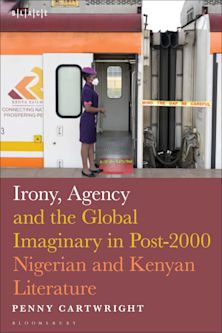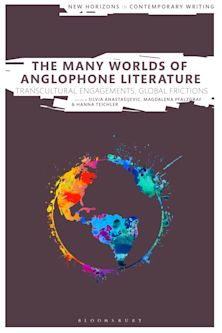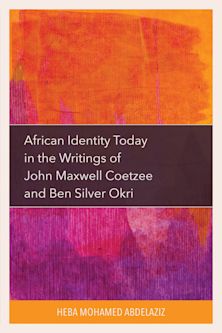- Home
- ACADEMIC
- Literary Studies
- African Literature
- Rewriting the Return to Africa
Rewriting the Return to Africa
Voices of Francophone Caribbean Women Writers
Rewriting the Return to Africa
Voices of Francophone Caribbean Women Writers
You must sign in to add this item to your wishlist. Please sign in or create an account
Description
Rewriting The Return to Africa: Voices of Francophone Caribbean Women Writers examines the ways Guadeloupean women writers Maryse Condé, Simone Schwarz-Bart and Myriam Warner-Vieyra demystify the theme of the return to Africa as opposed to the masculinist version by Négritude male writers from the 1930s to 1960s. Négritude, a cultural and literary movement, drew much of its strength from the idea of a mythical or cultural reconnection with the African past allegorized as a mother figure. In contrast these women writers, of the post-colonial era who are to large extent heirs of Négritude, differ sharply from their male counterparts in their representation of Africa. In their novels, the continent is not represented as a propitious mother figure but a disappointing father figure. This study argues that these women writers' subversion of the metaphorical figure of Africa and its transformation is tied to their gender. The women novelists are indeed critical of a female allegorization of the land that is reminiscent of a colonial or nationalist project and a simplistic representation of motherhood that does not reflect the complexities of the Diaspora's relation to origins and identity. Unlike the primary male writers of the Négritude movement, they carefully "gendered" the notion of return by choosing female protagonists who made their way back to the Motherland in search of identity. I argue that writing is a more suitable space for the female subject seeking identity because it allows her to have a voice and become subject rather than object as that was the case with the Négritude writers. The women writers' shattering of the image of Mother Africa and subsequently that of Father Africa highlights the complex relationship between Africa and the Diaspora from a female point of view. It shifts the identity quest of the characters towards the Caribbean, which emerges as the real problematic mother: a multi-faceted, fragmented figure that reflects the constitutive clash that occurred in the archipelago between Europe, Africa, and the Americas where the issues of race, gender, class, culture, ethnicity, history, and language are very complex.
Table of Contents
Chapter 1: Return to Africa and the Caribbean
Chapter 2: Toward a Creole Poetics
Chapter 3: Rethinking the Return and Writing the Self
Conclusion
Product details
| Published | 16 Aug 2011 |
|---|---|
| Format | Ebook (PDF) |
| Edition | 1st |
| Extent | 146 |
| ISBN | 9798216288275 |
| Imprint | Lexington Books |
| Publisher | Bloomsbury Publishing |
About the contributors
Reviews
-
François's engaging study of three Francophone Caribbean women writers--Guadeloupeans Maryse Condé, Simone Schwarz-Bart, and Myriam Warner-Vieyra--provides an interesting take on an old theme (taken up principally by male Caribbean writers): the allegorization of Africa as the nurturing mother. For these women, Africa assumes an opposite, though unfulfilling, patriarchal figure. In looking at two of the giants of Francophone Caribbean writing, Condé and Schwartz-Bart, and the less-known Warner-Vieyra, François (Eastern Univ.) differentiates the Antillean male/female sentiment of a mythical return to Africa. Reminiscent of Chantal Kalisa's Violence in Francophone African and Caribbean Women's Literature (CH, Jul'10, 47-6129), which took a feminist perspective in opposition to the patriarchal discourse of male writers in the Caribbean diaspora, the present title provides fresh feminist interpretations of the nostalgic yearnings for a welcoming Africa. In considering each author's search for Caribbean self-identity, François extends beyond the limitations imposed by the negritude and Creole of pre- and post-independence writing; she envisions writings by the women as a willful act of cultural identity rooted in the Caribbean rather than in a search of a mythical nurturing Africa. For these women, writing is a migratory journey that reconnects yearnings for identity to renewed Caribbean feminist understanding of self. Summing Up: Recommended.
Choice Reviews
-
Rewriting the Return to Africa: Voices of Francophone Caribbean Women Writers is a refreshing addition to the scholarship on French Caribbean literature. This book brings an exciting perspective to debates on differences between the productions of a "post-independence" generation of women writers and those of earlier male writers of the Négritude era in relation to their concept of an allegorical Africa. In an incisive analysis of selected novels by Maryse Condé, Simone Schwarz-Bart, and Myriam Warner-Vieyra, Dr. François argues persuasively that the subversion of the metaphorical figure of Africa by these women writers is tied to gender, as they challenge masculinist versions of the return to an idealized and mythologized mother/father figure. Dr. François presents the intriguing proposition that global nomadism may be the defining characteristic of post-Negritude writers and that, for women writers, the act of writing itself replaces the quest for Africa as a space to seek identity and happiness. This is a fascinating study that brings new insights to texts that have already become canonical and offers alternative interpretations of the preoccupation with identity which plays such a dominant role in the literary history of the French Caribbean.
E. Anthony Hurley, Ph.D., Stony Brook University
-
Rewriting the Return to Africa: Voices of Francophone Caribbean Women Writers meticulously demonstrates that the notion of return to Africa - be it metaphorical, physical or spiritual - has a long history in Caribbean literature and culture. The text explores the complexity of return as it relates to identity, language, gender and culture. Ultimately, this book challenges the myths of the return to origins and examines errancy among other possibilities as an alternative to Africa-the father/mother land.
Cécile Accilien, Columbus State University
-
Rewriting the Return to Africa makes a long over-due and compelling argument about the way we position women's literature in the Francophone Caribbean tradition. Focusing on works by Maryse Condé, Simone Schwarz-Bart, and Myriam Warner-Vieyra written in the era following African independence, Anne François identifies a key recurring trope: Africa as a "disappointing father figure." In tracing the variations on this theme, she shows convincingly that we must identify Caribbean women's writing of this period as constituting a movement in its own right, one that stands as a bridge between Négritude and Créolité. Lucidly written and clearly argued, Rewriting the Return to Africa will be of great interest to students as well as experienced scholars of Francophone Caribbean and post-colonial literatures.
Valerie Kaussen, University of Missouri-Columbia
-
François’s thesis that Condé, Schwarz-Bart, and Warner-Vieyra transformed the myth of Africa as motherland to which Caribbean cultures must necessarily return provides an insightful and original analysis of the role that these now canonical writers have played in Caribbean identity construction. Offering a more complex vision of any Caribbean identity, François shows how these three writers advocate global nomadism over mythical return, and an appreciation of métissage and the local over the celebration of Africa, thus postulating a transnational identity, particularly where women are concerned. The first study to bring together these three Guadeloupean writers, and to identify their pivotal role in the development of Franco-Caribbean discourse, this is a useful addition to Caribbean literary studies. Rewriting the Return to Africa will be of interest to scholars of Caribbean, Francophone, and women’s writing, and is accessible to an undergraduate as well as a scholarly readership.
Bulletin of Francophone Postcolonial Studies



































